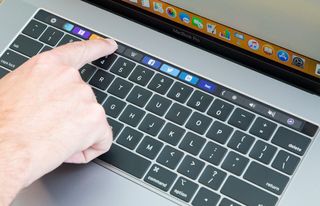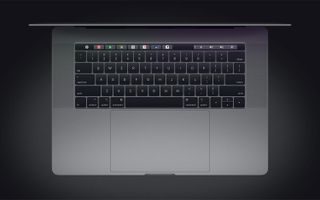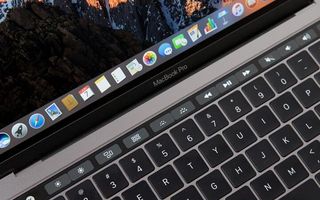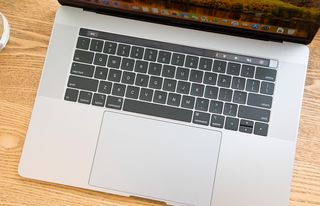Apple Must Ditch the MacBook Butterfly Switch to Regain Trust
As Apple rolled out its new MacBook Pros in May, I scanned its press release for one word, and one word only: keyboard. Completely absent from the announcement, Apple's troubled keyboard switches have become the elephant in the room that even the company doesn't want to acknowledge.

But those who read about the new MacBook Pros throughout the tech press, including here at Laptop Mag, found a message that wasn't fit for Apple's own announcement. The company made a change to the material in the mechanism to make the Butterfly keyboard more reliable, a change that Apple didn't detail for reporters.
A lack of answers
So, what is this mysterious change that's supposed to stop keys from getting stuck or creating double-clicks? Tech dissectors iFixit used Fourier Transform Infrared (FTIR) spectroscopy – shining an infrared light and measuring the amount of light absorbed – to figure out the materials.

The new keys feature a new switch cover, with the 2018 material likely being a kind of TPU (thermoplastic polyurethane, a kind of plastic), and the 2019 material matching polyamide, which is known as nylon. Unfortunately, the firm couldn't deduce how this would help. Also, the metal dome in the switch, which could contribute to key failures, may have changed.
All those maybes and could haves you've seen above don't need to be there, though, as iFixit didn't need to be the ones to try and fathom the new keys. Apple's decision not to explain the change fully doesn't help me want to invest in a new MacBook, something I'll need to do sooner or later (my MacBook Pro is from 2012).
Should we trust this new keyboard?
Stay in the know with Laptop Mag
Get our in-depth reviews, helpful tips, great deals, and the biggest news stories delivered to your inbox.
The Butterfly-style switch – notorious over the years for failures and spawning class-action lawsuits – has created a serious problem: distrust in Apple.
iFixit CEO Kyle Wiens hopped on the phone with me to help break it down, telling me, "we don't know what [Apple's] failure determination is, we know they're unreliable, that there are two failure modes: with keys sticking or clicks not registering."
"Having something as important as a keyboard be so divisive is untenable for a product with only a single vendor," said iMore editor-in-chief Rene Ritchie.

While Ritchie notes that "Some people prefer the feel of the new keyboard, others hate it," and that "This alone should prompt changes, any and all issues aside."
Apple may not have told us what's improved in the keyboard, but Wiens is ready to give them some credit: "I would imagine they made the changes for a good reason, that they think it will improve the reliability, so my expectation is that it will improve the reliability," Wiens said, before strongly emphasizing the word "somewhat."
"Will it fix the issue completely?" he asked, almost rhetorically, "I kinda doubt it."
"Having something as important as a keyboard be so divisive is untenable for a product with only a single vendor." — Renee Ritchie, iMore editor-in-chief
I've heard too many horror stories to disagree, as I often recoil when I see the butterfly keys.
When asked if Apple's lost the public's trust on this topic, Wiens told me "I think so, it sure seems like, this is attempt number 4, after their previous three attempts where they said 'it's fixed now.' — yeah, I am skeptical."
When I asked Mr. Ritchie about the switch's reputation, he said that while the amount of MacBook keyboard problems could be higher than we know, the increased "negative sentiment" may be induced by "clickbait and social pile on."
MORE: Best and Worst Laptop Brands
"Either way," Ritchie said, "the butterfly keyboard brand has been damaged to the point it may no longer be viable or worth salvaging. "
These keys are even pushing users away from Apple's ecosystem: "Everyone I'm talking to is talking about whether they're going to skip to the Dell XPS line," Wiens said, before revealing that he "just bought a HP Elitebook 1050 G1, and it's been great."
A bit surprised that he switched (I couldn't), I asked if he'd been using a Mac before. "I had a 2012 MacBook Pro, which I still think is the best MacBook Pro they've ever made."
How can Apple reverse course?
When asked if a new keyboard (such as the switches in Apple's Magic Keyboard) would fix things for him, Wiens disagreed.

"It would take more than that," he said. "We rate these things on our repairability scale, and these MacBooks are getting a 1 out of 10, so I've got lots of other problems with the design, in addition to the keyboard."
"What's crazy about this is no one else in the world is having problems with keyboards, this is something that the industry solved thirty years ago."— Kyle Wiens, iFixit CEO
Wiens agreed with me, though, that "in terms of the keyboard recommendation, it would take a different mechanical design." This is why I read the Apple press release looking for the word "keyboard," as Apple will need to switch from the Butterfly keys for me to be comfortable recommending MacBooks again.
This all feels insane. As Wiens told me, "What's crazy about this is no one else in the world is having problems with keyboards, this is something that the industry solved 30 years ago."
"Apple has consistently told its designers 'don't worry about repairability, it's fine' and that attitude needs to change," Wiens said, noting "Apple's got smart engineers and designers, they could figure out a way to make these things repairable and not increase the thickness. They've just chosen not to."
What should you do?
My mom needs a new laptop and she wants a MacBook, and I'm having trouble recommending one. Even though I've never, personally, found a failing keyboard in a MacBook I was using, I don't feel comfortable — after everything I've seen and read — recommending that she buy one. Apple says it's trying to cut down repair times to "next day" turnaround, but even that's too long if you need your laptop.

The current MacBook Airs don't even have the new and tweaked keyboard, instead featuring the previous generation of the switch. So, I'm doing something that disgusts some of my colleagues: recommend that my mom buy the pre-Retina MacBook Air, which has the old, trustworthy keyboard — and an ever-aging 5th Gen Intel processor (PCs are up to the 10th generation).
Most people facing this situation would do what Mr. Wiens did: switch to a PC. I tried to do so last year, and found that I just couldn't stomach switching to Windows, even with the very-similar Huawei MateBook X Pro.
MORE: 2019 MacBook Pro Unveiled: 9th Gen Intel CPUs, New Butterfly Keys
"Rumor has it the next MacBook Pro redesign has an all new keyboard with new switches, so a lot of the current angst around the long-term fallout of any of this may be short lived," said Ritche. For all of our sakes, I hope he's right.
I also hope my 7-year-old MacBook Pro lasts to see its 8th birthday this fall, when Apple would likely roll out a new model. If it bites the dust before then, I've got a hard decision to make.
Credit: Laptop Mag; U.S. Patent and Trademark Office
